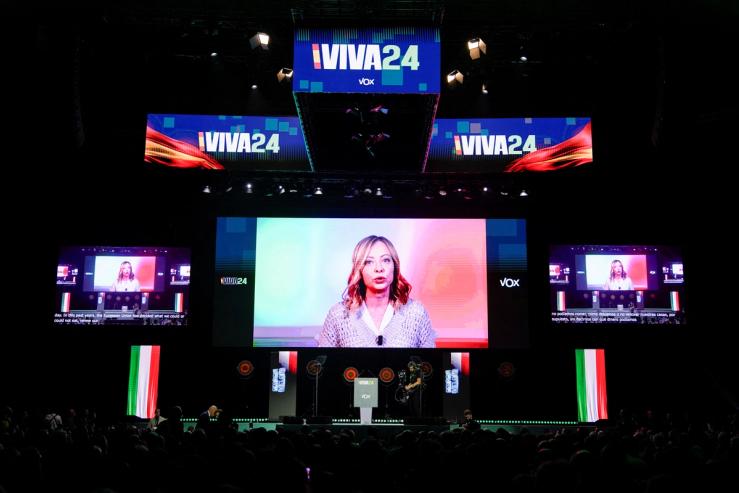The News
Europe’s far-right unofficially launched its election campaign ahead of voting for the European Parliament next month, presenting a united front of leaders from across the continent who criticized illegal migration, globalism, and socialism.
Hungarian Prime Minister Viktor Orbán, Italian Prime Minister Giorgia Meloni, and France’s leading opposition candidate Marine Le Pen all gave speeches at the massive rally, along with several non-European figures who hope the same right-wing populist wave that has swept through other parts of the world will similarly sweep Europe in the bloc’s June elections.
Argentina’s President Javier Milei spoke at the event, triggering a diplomatic row by calling the wife of Spain’s prime minister corrupt, while an Israeli minister and allies of former US president Donald Trump also attended.
SIGNALS
Far right is ascendant, but unlikely to wield much power
Europe’s right-wing parties have momentum, with recent polls suggesting they could win up to a quarter of the seats in the European Parliament. Though they are unlikely to wield much power there, gains in Brussels could boost nationalist parties in individual European states and give them more influence over the bloc’s trajectory, analysts said. Yet the top two far-right groups disagree so much that “it is difficult to see them working together,” The Guardian’s Europe correspondent wrote. They are especially split on Russia: One faction, led in part by Italy’s Giorgia Meloni, has proven pro-Kyiv, while the other group that includes Germany’s AfD party is more Russia-friendly.
Europe’s youth is crucial to far-right rise
Research shows more of the continent’s youth prefer nationalist and Euro-skeptic parties. Under new rules, 16- and 17-year-olds in some countries will be able to vote, and “there had been hope that these new voters would put a brake on the populist surge engulfing Europe,” Foreign Policy wrote. But young people don’t see the parties as that extreme anymore “as they’ve been around for a while now. And young people think that the mainstream parties have had their chance,” a Dutch political scientist told the magazine. Experts have pointed to a broader unhappiness with politics and the economy. Some Dutch analysts used the word “bestaanszekerheid” to describe the concerns, which translates to “livelihood security.”
The left is making its own push for power
Left-leaning and pro-European factions, meanwhile, are trying to drum up support and clout. The Greens, for example, are expected to suffer losses, but are angling for power in Brussels, possibly through a commission seat. Center-right Commission President Ursula von der Leyen holds some of the cards: Recently she said she was open to working with more conservative parties to remain president. But she could also try to work with the Greens by taking a more active stance on climate policy, Politico EU’s chief EU correspondent said. “Right now, von der Leyen is saying, ‘I don’t know. It depends.’ The Socialists, the Liberals, the Greens are telling von der Leyen that now is the time to choose.”



